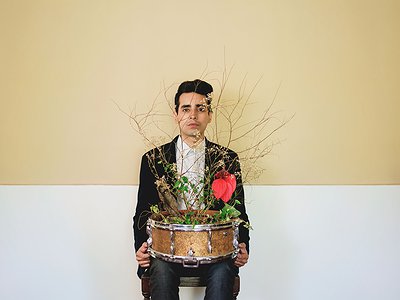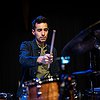Name: Tarun Balani
Nationality: Indian
Occupation: Composer, drummer
Current release: The Shape Of Things To Come on Tarun Balani's bandcamp
Recommendations: A book that I would like to recommend is titled ‘Reshaping Art’ by TM Krishna who is a Carnatic vocalist, author and activist.
A piece of art that I would like to recommend is by the Indian Artist Prabhakar Barve. The title of this specific painting is ‘The Other Shore’ and sat on my piano top for a very long time.
If you enjoyed this interview with Tarun Balani and would like to find out more about him and his work, his personal website is the perfect place to start.
When did you start playing your instrument, and what or who were your early passions or influences? What what is about music and/or sound that drew you to it?
I first started playing drums at the age of 13 or 14 but my first instrument was actually the keyboard.
My brother who was learning the guitar at that time, his teacher would come once or twice a week to give him private lessons and he noticed I was noodling on the Casio keyboard. So he started to show me a couple of scales and certain chords. I started playing in school bands and these were large ensembles with a couple of keyboard players, guitar players, a drummer and a percussionist. So a lot of unison lines and songs which were typically pop or rock songs that we would play at competitions.
There was one specific incident that led me to switch from keyboards to drums. At one of the events when I was playing the keyboard, somebody at the time of changeover of the bands knocked over the adaptor of my keyboard which basically led to no sound coming out. For that 15-20 minute performance I was quite perplexed and hassled on stage. I didn’t enjoy my performance at all and rushed backstage and told my teacher how I wasn’t audible and couldn’t really play or engage with the band. He responded saying it doesn’t really matter and that it was a large ensemble so no one really noticed. But it mattered to me.
I was really young and the next day I wanted to let my teacher know that I no longer wanted to be a part of the band for this reason. In a very revolt like attitude I started to march towards the music room and while I was marching towards the music room, there was another senior band that was rehearsing a rock tune either by AC/DC or Iron Maiden. The power of the beat is what attracted me to the drums. By the time I entered the music room, the first thing I saw was a senior playing the fibre glass drum set and that was it. It was love at first sight. I had no idea why I never thought of approaching or playing the drums. Thats’ when I actually switched. The intensity, the power of the beat and the mechanics that the drum set offers and coming from a sports background is what drew me to the instrument.
What drew me to the specific music that I play now is inspired by another incident, when I first arrived in New York at the age of 18 and one of my first concerts at the Village Vanguard I saw the legendary drummer and composer Roy Haynes leading his quintet. That was the moment when I realised, this is what I want to play - acoustic improvised music. I want to lead my own group and I want to improvise.
For most artists, originality is first preceded by a phase of learning and, often, emulating others. What was this like for you? How would you describe your own development as an artist and the transition towards your own voice? What is the the relationship between copying, learning and your own creativity?
This is an interesting question because I think it was the reverse for me in some ways. With having no access to good educators, proficient musicians and teachers, I started to approach the drums in a very unique and unorthodox way. Whilst I was very much aware that I lack the fundamentals, I was quite poor at reading and the basic foundation of drumming like independence and rudiments. However, because I was engaging with musicians and creating new music, that gave me an insight into the creative process very much like a beginner’s mind or like a mind of a child where I was extremely excited and always very enthusiastic when I was approaching the drums. That wiring in the beginning was very crucial in my musical development.
The way I approach the drums and even till today has some of that child like quality where I am always very enthusiastic to learn and constantly shed skin and rewire my approach to the instrument. When I actually went for formal education in music, I had to switch gears and almost not allow myself to get carried away with the creativity and originality that was spewing out of me at that time, but actually focus on the fundamentals and the bare basics of the art form and the instrument.
I was very fortunate to goto the Berkelee college of music and study with some of the greatest educators such as Ralph Peterson Jr. Terri Lyne Carrington, Jon Hazilla and the list goes on. I had to make that switch at college and post that is when when the equilibrium started to set in. I continued to emulate the heroes and artists I look upto - drummers like Tony Williams, Max Roach, Elvin Jones and study the history and tradition of improvised music; yet working on finding my creativity and output that was truly my own every time I made a record or an artistic statement. It was based on the present moment whilst drawing inspiration and information from all the traditional studies that I done previously.
That equilibrium for me is what I am constantly seeking till today. There is a quote by a very famous trumpeter Clark Terry that really resonated with me - “Imitate, Assimilate and Innovate”. This 3 step process is in continuum for me with my everyday arts process.
What were some of your main artistic challenges when starting out as an artist and in which way have they changed over the years?
I think some of the initial challenges were divided into separate segments for me. One was the geographical challenge.
I quite purposely decided to stay in India and make India my base. My band was spread across New York and Europe. So all of us being in different parts of the world is something that I had to deal with. Another artistic challenge which is still something I am grappling with is the tag of being South Asian or being Indian where people don’t really understand or see that improvised music that very much sounds like the new UK Jazz or New York jazz scene in terms of it’s sound and aesthetic can be made by a person living in New Delhi. So when I send my press releases or engage with journalists or musicians across the world, that is something I find quite fascinating because they can’t fathom that this is a reality.
The final artistic challenge for me which I am finally able to overcome is the unapologetic way of expressing myself and being quite confident in the fact that whilst I am from India, my expression and sound is quite global. That is purely because I am immersing myself in these cultures, travelling, spending time touring and engaging with artists and musicians and scenes in different parts of the world but then coming back home and drawing influence and telling stories from my perspective which is from where I am, New Delhi India.
Tell me about your instrument, please. How would you describe the relationship with it? What are its most important qualities and how do they influence the musical results – and possibly even your own performance?
As I mentioned before, it was the power of the beat that drew me to the drum set. Also the fact that there is a physicality and quite a few mechanics involved that engage your entire body. I think, rhythm really relates to your entire body and that’s what I like about the drums. When I am playing the drums and improvising I feel like I am completely immersed and engaged in the instrument with my entire body, mind and soul. While drums are a very powerful instrument, you can really dictate and conduct the course of the music with the instrument in a very powerful way.
I think the role I see playing in my group and the music that I play is the reverse of that. I spend a lot of time on the composition, arrangement and thinking about the story telling in the music. I don’t spend a lot of time on designing the drum grooves or more specific beats or rhythmic patterns that I would play on the drums. That would become a byproduct of all the compositional work that I’ve done and the improvisation that happens in real time. I also take the liberty to use at times the power of this instrument to sort of navigate or conduct a musical situation, especially in my band Dharma.
However recently, I am taking a backseat and letting the moment, the improvisation and other musicians decide the course but being mindful of the entire picture when I am sitting behind the drum set and not necessarily just playing the role of a drummer but also playing the role of a conductor or band leader. So I find my position behind the drums quite challenging at times.




